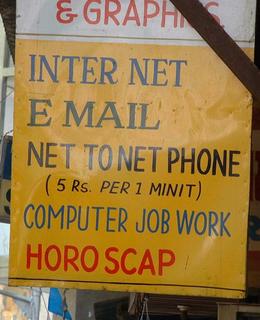 dia that specializes this art is Gujarat. You find the best among the worst at the best of places. Colorful displays like Raju Tea Stole, Marshall Bekary Centre, Contat hear for Marrage Burro are some of the best versions available. And mind you, these are prominently displayed at market places. The guys at these stores stare at you as if they are proud owners of online Oxford dictionary. No wonder the Chief Minister of the state proposed introducing English as a compulsory language from standard one. But his efforts are not visible in the text books that is taught to the English medium schools in the state.
dia that specializes this art is Gujarat. You find the best among the worst at the best of places. Colorful displays like Raju Tea Stole, Marshall Bekary Centre, Contat hear for Marrage Burro are some of the best versions available. And mind you, these are prominently displayed at market places. The guys at these stores stare at you as if they are proud owners of online Oxford dictionary. No wonder the Chief Minister of the state proposed introducing English as a compulsory language from standard one. But his efforts are not visible in the text books that is taught to the English medium schools in the state."India suffered from communal secularism, communal riots, and migration of Hindu and Muslims as gift in heritage."
Only the Chief Minister can explain what is the meaning of 'communal secularism.' In fact the state government should apply a patent for this. This is not the end of stupidity in the book. Here are some more.
India is a republic. It means the people elect the head of the State, i.e., the President.
Imagine the state making itself a fool by putting out foolish statements like this:
"The growth of population is more in Rajasthan, Bihar, Uttar Pradesh, Madhya Pradesh etc. So, the literacy is also more in these states."
The entire nation knows these are BIMARU states and have the lowest literacy in India. Perhaps, the BJP has chance in all these states and that must be the reason for this exception. With the type of English taught, no wonder the shopkeepers have their own innovative mode of writing English.
Different states speak different types and different versions of English. But there are some states which is only catching up now and Gujarat is one of them. Parents are now vying for English medium education for their children. Because of this craze, new self-financed schools have come up. They charge exorbitantly but the cash rich parents are under the impression that more the fee, better the school. So when the socialite women discuss the 'plight' of their children in respective schools, they don't forget to mention the fee they pay.Most of the urban elite studying in English medium in urban areas 'flee' either for 'higher studies' or take up jobs anywhere in the world except India. Most of them choose either UK or US for higher studies because their parents can afford to spend a fortune. They never come back. But the rural areas are not as lucky. Take for instance a place like Anand. It is one of the most prosperous districts in Gujarat. More than 70 percent of the Anand population is in the United States and those who are left behind are the daily wage laborers. The minimum wage rule does not apply here. The wage that a daily wage labourer gets at the end of a grueling day's work is Rs 22( 50 cents ) and ask for an increase of a single rupee, the landlord will replace them with tribal laborers who are available at half that rate.So what future can they envisage for their children even if both the husband and wife are employed?
 te on their sleeves just by being able to speak fluent English. In fact the higher caste people gets highly impressed with such attitude. They forget their caste differences for a moment initially and then forever gradually. This is precisely the reason the right wing Hindu organization RSS is not in favour of introducing English in early schooling. If a lower caste overtakes a higher caste person with his skills in English, that will be the end of the organization, its ideology and its mass base. Where will they get an army to fight for Hinduism against Mughals and Christians? Despite not being allowed to enter the Hindu fold, the lower castes still form a major chunk of the fighters that the RSS boasts of. The credit goes to either the RSS think tank or the fools in the low castes.Knowing English is not only knowing ABCD or its vocabulary. It is more about knowing the world. It allows you to peep into a world where there are no boundaries whether it is Internet or simply English newspapers or magazine. But unfortunately most low castes cannot afford education leave alone English education. The government have schemes that aims to bring the lower castes and the poor to the mainstream but the benefit is being availed by a select few who are super rich but still takes advantage of their caste factor. These few have ensured that the lowest among the low do not get the benefits from the government including that in the education sector.In a country of more than one billion, streamlining these problems are not going to be easy. And the first group that will oppose any change that could benefit the poorest and lowest in the economy or caste sector will be the upper crust of the lower caste themselves.So how can a brilliant student from a poor rural family go to English medium school? After so many permutations and combinations, there is only one conclusion. It is a foregone conclusion.
te on their sleeves just by being able to speak fluent English. In fact the higher caste people gets highly impressed with such attitude. They forget their caste differences for a moment initially and then forever gradually. This is precisely the reason the right wing Hindu organization RSS is not in favour of introducing English in early schooling. If a lower caste overtakes a higher caste person with his skills in English, that will be the end of the organization, its ideology and its mass base. Where will they get an army to fight for Hinduism against Mughals and Christians? Despite not being allowed to enter the Hindu fold, the lower castes still form a major chunk of the fighters that the RSS boasts of. The credit goes to either the RSS think tank or the fools in the low castes.Knowing English is not only knowing ABCD or its vocabulary. It is more about knowing the world. It allows you to peep into a world where there are no boundaries whether it is Internet or simply English newspapers or magazine. But unfortunately most low castes cannot afford education leave alone English education. The government have schemes that aims to bring the lower castes and the poor to the mainstream but the benefit is being availed by a select few who are super rich but still takes advantage of their caste factor. These few have ensured that the lowest among the low do not get the benefits from the government including that in the education sector.In a country of more than one billion, streamlining these problems are not going to be easy. And the first group that will oppose any change that could benefit the poorest and lowest in the economy or caste sector will be the upper crust of the lower caste themselves.So how can a brilliant student from a poor rural family go to English medium school? After so many permutations and combinations, there is only one conclusion. It is a foregone conclusion.Binu Alex

